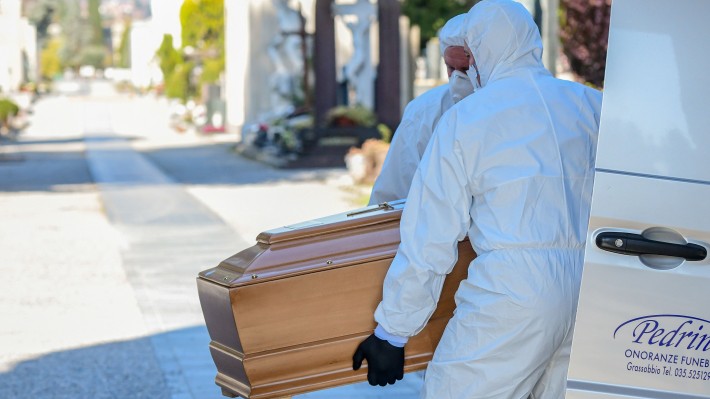Life inside the Italian coronavirus lockdown
Prime Minister Conte says restrictions on movement to be prolonged

A free daily email with the biggest news stories of the day – and the best features from TheWeek.com
You are now subscribed
Your newsletter sign-up was successful
Italy’s nationwide lockdown is to be extended beyond the current end date of 3 April, Prime Minister Giuseppe Conte announced, after the country recorded its highest number of deaths from coronavirus in a day.
Italian health authorities reported 475 new fatalities from the virus on Wednesday, taking the death toll to almost 3,000. It remains the country with the highest number of coronavirus cases outside China, at more than 35,000 according to latest figures.
Italy has introduced a host of draconian measures aimed at curbing the outbreak. Many other countries and cities – including London – expected to follow suit in the coming weeks.
The Week
Escape your echo chamber. Get the facts behind the news, plus analysis from multiple perspectives.

Sign up for The Week's Free Newsletters
From our morning news briefing to a weekly Good News Newsletter, get the best of The Week delivered directly to your inbox.
From our morning news briefing to a weekly Good News Newsletter, get the best of The Week delivered directly to your inbox.
What are Italy’s restrictions on movement?
Millions of Italians have been forced to stay at home since 9 March, when PM Conte introduced a national quarantine policy.
“There won’t be just a red zone,” he said. “There will be Italy.”
The government decree also ordered the closing of shops, bars, restaurants, gyms and swimming pools. All public events have been cancelled, and cultural centres, museums and ski resorts have all been shut down.
A free daily email with the biggest news stories of the day – and the best features from TheWeek.com
Since then, citizens have been able to leave their homes only for “essential” purposes such as work, health-related reasons or to do food shopping. Only pharmacies and grocery stores remain open, all other shops have been closed.
Anyone with symptoms must not leave the house under any circumstances. Those wishing to travel must obtain a permit, citing a valid work or family reason.
Permits are granted only for “urgent, verifiable work situations and emergencies or health reasons”.
Those accompanying the sick to hospital will no longer be able to use hospital waiting rooms without permission.
Italy has also suspended prisoners’ right to visits from family and friends, causing riots to break out in jails across the country.
How is it policed?
Police stopped and checked 700,000 citizens between 11 and 17 March, 43,000 of whom were found to have violated the decree, says The Guardian.
In Sicily, one man who had tested positive for coronavirus was encountered by police while out shopping, despite the order to stay at home. Prosecutors accuse him of “aiding the epidemic”. If convicted, he faces up to 12 years in prison.
On 10 March, a 30-year-old man was discovered by police in Turin at 2.30am attempting to solicit a sex worker.
Numerous priests and families of the dead have been charged for officiating at and attending funerals, which are currently banned.
In Aosta, in northwest Italy, a man is being investigated for “aggravated attempt to spread the epidemic” after he failed to inform his doctors of suspected coronavirus symptoms before undergoing plastic surgery on his nose. He subsequently tested positive.
-
 What is the endgame in the DHS shutdown?
What is the endgame in the DHS shutdown?Today’s Big Question Democrats want to rein in ICE’s immigration crackdown
-
 ‘Poor time management isn’t just an inconvenience’
‘Poor time management isn’t just an inconvenience’Instant Opinion Opinion, comment and editorials of the day
-
 Bad Bunny’s Super Bowl: A win for unity
Bad Bunny’s Super Bowl: A win for unityFeature The global superstar's halftime show was a celebration for everyone to enjoy
-
 Epstein files topple law CEO, roil UK government
Epstein files topple law CEO, roil UK governmentSpeed Read Peter Mandelson, Britain’s former ambassador to the US, is caught up in the scandal
-
 Iran and US prepare to meet after skirmishes
Iran and US prepare to meet after skirmishesSpeed Read The incident comes amid heightened tensions in the Middle East
-
 Israel retrieves final hostage’s body from Gaza
Israel retrieves final hostage’s body from GazaSpeed Read The 24-year-old police officer was killed during the initial Hamas attack
-
 China’s Xi targets top general in growing purge
China’s Xi targets top general in growing purgeSpeed Read Zhang Youxia is being investigated over ‘grave violations’ of the law
-
 Panama and Canada are negotiating over a crucial copper mine
Panama and Canada are negotiating over a crucial copper mineIn the Spotlight Panama is set to make a final decision on the mine this summer
-
 Why Greenland’s natural resources are nearly impossible to mine
Why Greenland’s natural resources are nearly impossible to mineThe Explainer The country’s natural landscape makes the task extremely difficult
-
 Iran cuts internet as protests escalate
Iran cuts internet as protests escalateSpeed Reada Government buildings across the country have been set on fire
-
 US nabs ‘shadow’ tanker claimed by Russia
US nabs ‘shadow’ tanker claimed by RussiaSpeed Read The ship was one of two vessels seized by the US military